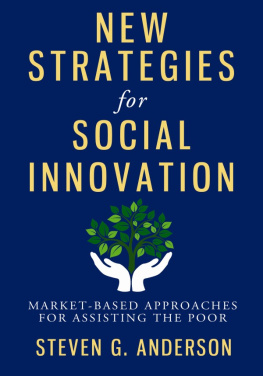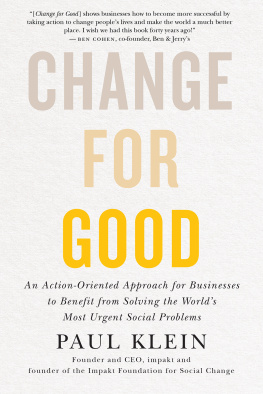Steven Anderson - New Strategies for Social Innovation: Market-Based Approaches for Assisting the Poor
Here you can read online Steven Anderson - New Strategies for Social Innovation: Market-Based Approaches for Assisting the Poor full text of the book (entire story) in english for free. Download pdf and epub, get meaning, cover and reviews about this ebook. City: New York, year: 2014, publisher: Columbia University Press, genre: Science. Description of the work, (preface) as well as reviews are available. Best literature library LitArk.com created for fans of good reading and offers a wide selection of genres:
Romance novel
Science fiction
Adventure
Detective
Science
History
Home and family
Prose
Art
Politics
Computer
Non-fiction
Religion
Business
Children
Humor
Choose a favorite category and find really read worthwhile books. Enjoy immersion in the world of imagination, feel the emotions of the characters or learn something new for yourself, make an fascinating discovery.
- Book:New Strategies for Social Innovation: Market-Based Approaches for Assisting the Poor
- Author:
- Publisher:Columbia University Press
- Genre:
- Year:2014
- City:New York
- Rating:4 / 5
- Favourites:Add to favourites
- Your mark:
New Strategies for Social Innovation: Market-Based Approaches for Assisting the Poor: summary, description and annotation
We offer to read an annotation, description, summary or preface (depends on what the author of the book "New Strategies for Social Innovation: Market-Based Approaches for Assisting the Poor" wrote himself). If you haven't found the necessary information about the book — write in the comments, we will try to find it.
This book is the first to assess emerging market-based social change approaches comparatively, focusing specifically on social entrepreneurship, corporate social responsibility, fair trade, and private sustainable development. Steven G. Anderson begins by identifying the problems these programs address and then describes their core, shared principles. He follows with a general framework for defining and evaluating these and other development approaches. Separate chapters provide background on the historical development and application of each approach, as well as interpretations of the processes for implementation and the underlying behavioral assumptions related to successful outcomes. A final chapter compares each approach across a set of important program development dimensions and analyzes the utility of market-based approaches as part of a general consideration of social development strategies for the developing world.
Steven Anderson: author's other books
Who wrote New Strategies for Social Innovation: Market-Based Approaches for Assisting the Poor? Find out the surname, the name of the author of the book and a list of all author's works by series.












 COLUMBIA UNIVERSITY PRESS NEW YORK
COLUMBIA UNIVERSITY PRESS NEW YORK
